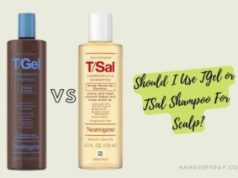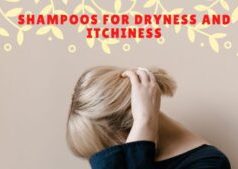It’s always interesting to check into new hair care procedures in the fight to maintain the health of your hair and scalp.
In the Curl Centric group, a lot of women have recently discussed the advantages of utilising lemongrass oil for hair growth, thickness, and overall scalp health. But lemongrass oil isn’t exactly a recent hair care innovation.
Nevertheless, it’s making a stir after being rediscovered as a successful way to address all kind of hair care issues while also enhancing the appearance of your hair. What exactly is lemongrass, and what benefits does it have for hair?
What Is Lemon Grass Oil?
Lemongrass essential oil is a concentrated aromatic oil derived from the lemongrass plant, scientifically known as Cymbopogon citratus or Cymbopogon flexuosus. Lemongrass is a tropical grass native to regions like Southeast Asia and Africa and is known for its citrusy, lemon-like scent and a variety of potential health and wellness benefits.
Why Try Lemongrass Oil?
People try lemongrass oil for various reasons due to its potential health and wellness benefits, as well as its versatile uses. Here are some common reasons why individuals choose to try lemongrass oil:
- Aromatherapy: Lemongrass oil is known for its uplifting and invigorating citrusy scent, making it a popular choice in aromatherapy. Inhaling its aroma may help reduce stress, anxiety, and promote a sense of relaxation and mental clarity.
- Muscle and Joint Relief: Some individuals use lemongrass oil topically, often diluted with a carrier oil, to massage sore muscles and joints. It is believed to have potential anti-inflammatory properties that can provide relief from muscle aches and pains.
- Skin Care: Lemongrass oil is used in skincare products for its astringent properties, which may help cleanse and tone the skin. It is also believed to have potential benefits for acne-prone skin.
- Hair Health: It’s sometimes added to hair care products due to its potential to promote a healthy scalp and hair growth. It may also help control dandruff.
- Digestive Support: Lemongrass oil is occasionally used to support digestion and alleviate digestive discomfort. It may have mild digestive properties when consumed in moderation and appropriately diluted.
- Insect Repellent: Lemongrass oil is a natural insect repellent and is used to deter mosquitoes and other pests. It can be used in candles, sprays, or diffusers to create a pest-free environment.
- Flavoring in Cooking: In some culinary traditions, lemongrass oil is used sparingly as a flavoring agent in dishes, especially in Southeast Asian cuisine. It imparts a lemony, citrusy flavor to food.
- Antioxidant Properties: Lemongrass oil contains compounds with potential antioxidant properties, which may help combat oxidative stress and support overall health.
- Reducing Fever: In some traditional herbal practices, lemongrass tea or oil has been used to help reduce fever and alleviate symptoms of colds and flu.
It’s important to note that while lemongrass oil has potential benefits, individual responses may vary. Some people may find it beneficial for their specific needs, while others may not experience the same effects. If you’re considering using lemongrass oil, it’s advisable to consult with a healthcare professional, especially if you have specific health concerns or are pregnant or nursing. Additionally, always use essential oils, including lemongrass oil, with caution and follow recommended dilution guidelines to avoid skin irritation or other adverse reactions.
How to Use Lemongrass Oil for Hair Growth and Care
Lemongrass oil can be used to promote hair growth and care due to its potential benefits for the scalp and hair. Here’s how you can use lemongrass oil effectively:
1. Dilute the Oil:
- Lemongrass oil is potent, so it’s crucial to dilute it before applying it to your hair or scalp. Mix a few drops of lemongrass oil with a carrier oil like coconut oil, jojoba oil, or almond oil. A typical ratio is around 2-3 drops of lemongrass oil per tablespoon of carrier oil.
2. Perform a Patch Test:
- Before applying the diluted oil to your scalp, do a patch test on a small area of skin to check for any adverse reactions or allergies.
3. Massage into the Scalp:
- Gently massage the diluted lemongrass oil into your scalp using your fingertips. The massage can help improve blood circulation to the hair follicles, potentially promoting hair growth.
4. Leave it On:
- Allow the oil mixture to sit on your scalp for at least 30 minutes, but it can be left on longer if desired. Some people even choose to leave it on overnight.
5. Shampoo and Rinse:
- After the recommended time has passed, shampoo your hair thoroughly to remove the oil. You may need to shampoo twice to ensure all the oil is removed. Use a mild, sulfate-free shampoo for best results.
6. Condition (Optional):
- You can follow up with a conditioner if you normally do so after shampooing. Make sure to use a conditioner that is suitable for your hair type.
7. Frequency:
- You can use this lemongrass oil treatment once or twice a week, depending on your hair and scalp’s needs. Overuse may lead to excessive dryness, so it’s essential to find the right frequency for your hair.
Additional Tips:
- Be consistent with your lemongrass oil treatments to see potential improvements in hair health and growth over time.
- Remember that results may vary among individuals, and it may take several weeks or months of regular use to notice significant changes in hair growth.
- Avoid using undiluted lemongrass oil directly on your scalp, as it can be harsh and may cause irritation or allergic reactions.
- If you have any existing scalp conditions or concerns, consult with a dermatologist or healthcare professional before using lemongrass oil or any essential oil on your scalp.
- Ensure that you are using high-quality, pure lemongrass essential oil from a reputable source for the best results.
Lemongrass oil can be a valuable addition to your hair care routine, but it’s important to use it cautiously and monitor how your hair and scalp respond. If you experience any adverse reactions, discontinue use immediately.
Also Read: How Long does Highlights Last? All You should know
How Long Can You Leave Lemongrass Oil in Your Hair?
The duration you can leave lemongrass oil in your hair depends on your hair type, sensitivity, and the specific treatment you’re using. Here are some guidelines:
- Short Duration (30 Minutes to 1 Hour): If you have sensitive skin or are using lemongrass oil for the first time, you can start with a shorter duration, such as 30 minutes to 1 hour. This allows you to test how your scalp reacts to the oil.
- Medium Duration (1-2 Hours): For a standard treatment, leaving diluted lemongrass oil in your hair and on your scalp for 1 to 2 hours is a common practice. This provides ample time for the oil to be absorbed and potentially benefit your hair and scalp.
- Longer Duration (Overnight): Some individuals choose to leave lemongrass oil in their hair overnight for a deep-conditioning treatment. If you opt for an overnight treatment, consider covering your hair with a shower cap or towel to prevent the oil from transferring to your pillowcase.
- Regular Use: If you plan to incorporate lemongrass oil into your regular hair care routine, a 1- to 2-hour treatment once or twice a week is generally sufficient. Consistency in use is key to potentially seeing benefits over time.
- Rinse After Treatment: Regardless of the duration, you should always thoroughly rinse your hair and scalp with water after the treatment to remove the oil. Follow up with a mild, sulfate-free shampoo to ensure all the oil is washed out.
Remember that the effectiveness of lemongrass oil for your hair and scalp may vary among individuals. It’s essential to monitor how your hair and skin respond to the treatment. If you experience any irritation, redness, itching, or other adverse reactions, discontinue use immediately.
Additionally, always dilute lemongrass oil with a carrier oil before applying it to your scalp to prevent any potential irritation or burning sensations. The recommended dilution ratio is typically a few drops of lemongrass oil per tablespoon of carrier oil.
As with any new hair care treatment, it’s a good idea to perform a patch test on a small area of skin before using lemongrass oil on your scalp to check for allergies or sensitivities. If you have any existing scalp conditions or concerns, consult with a dermatologist or healthcare professional before using lemongrass oil or any essential oil on your scalp.






